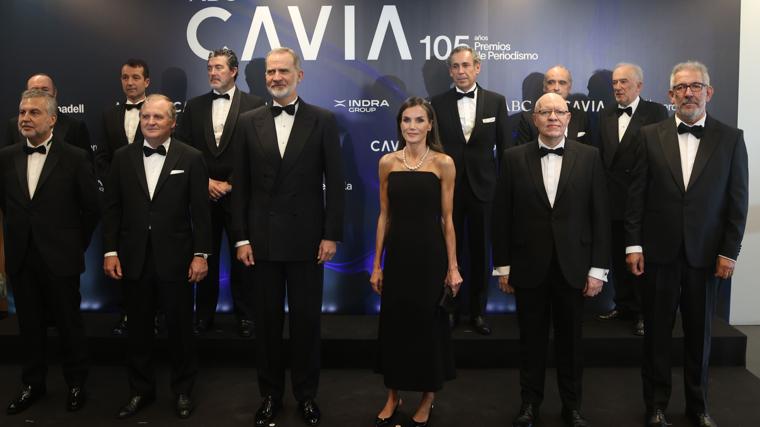Jorge Fernández Díaz, Cavia Prize winner: "In a world where lies are the law, truth will continue to be a noble business."

Your Majesties, President of the Vocento Group, Director of the Royal Spanish Academy, friends, ladies and gentlemen:
I feel compelled to dedicate this happy moment to my Asturian parents, who were a product of the poverty of the post-Spanish Civil War and then of the great epic emigrant struggle in Latin America: Marcial and Carmina, who were hard-working waiters in Buenos Aires and who viewed with very reasonable skepticism my dedication to journalism and literature. If they were still alive, we can be sure they would have experienced joy and perplexity upon seeing their son win the Nadal in January and the Cavia in June. I share their same feelings of surprise and joy, and I thank the prestigious jury of the Mariano de Cavia, a legendary award for the entire international press. It is a great honor for me to receive this award in the land of the greatest columnists this language has ever produced, masters of whom I was and remain a fervent reader. I accept it, however, on behalf of the faithful infantry of journalism: I was once one of them myself and grew up in a newsroom; I'm referring to the reporters who are on the ground all day long, who manage to leak us the most sensitive information hidden by those in power and who keep this uncomfortable and cursed profession alive, yet so essential to a democracy.
On the surface, this article—'Welcome to Right-Wing Populism'—is about how a head of state repeatedly insults a critical journalist, and how the latter responds with his library of books. But it actually alludes to something less personal and deeper, namely the transformation that old categories—liberalism, conservatism, social democracy—experience when they are captured by populist formats. And how demagoguery, the cult of personality, and divisiveness, when they become deliberate state policies, not only generate polarization, a culture of adulation, confirmation bias, and bubbles of meaning, but also an unviable democracy of extremes, or what an intellectual from my country once called "a civil war of the spirits."
Due to the dynamics of social media, the actions of so-called "engineers of chaos," or the constant incitement of hatred, the most astute journalist can fall into the easy trap of acclimatizing himself to the criteria of his own audience and, consciously or unconsciously, forgetting equanimity and common sense, and submitting to their tribal tyranny. We must not upset that beloved and stubborn "despot" who reads or listens to us and pays our salary, and who sometimes demands confirmation of a prejudice, the denial of an inconvenient fact, the comfort of a fallacy. The most dangerous decision, then, is not ideological but ethical. It consists of sometimes resisting his siren calls and, without abandoning our honest point of view, being capable of not forgiving certain politicians what we would not forgive their antagonists. Acting in good faith and not submitting to double standards can be very risky in this binary world of demagoguery and cross-resentments, but it's the only way—in this veteran's opinion—to maintain moral authority. Without it, our word isn't worth a cent.
 Gallery.
Photo gallery: the Cavia Awards gala, in pictures
abc
Gallery.
Photo gallery: the Cavia Awards gala, in pictures
abc
These populisms of different ideologies, which lend each other the technology of intimidation, have come to the conclusion that governing consists primarily of storytelling. Thus, any public administration today is a ceaseless factory of fictional literature: hoaxes, manipulations, smokescreens, fallacious arguments. Independent journalists, the spoilsports who refuse to be militants or chameleons, or to submit to the affectionate demand of double standards demanded by some of their own readers, are in the crosshairs, since they are the only ones who can challenge the literary narrative of the powerful with data and lucid reasoning. That is why we are so dangerous to the powers that be at this moment in history.
We are also heading toward a world of lies, in which not only governments and their online fanatics will deceive, but also pressure and interest groups: all of them will make massive and malicious use of artificial intelligence. Very soon, in this way, we will no longer know what is true and what is a deceitful fantasy. Reliable, traditional journalism will continue to be the only one we turn to effectively determine what is reality and what is a farce. In a world where lies are the law, truth will continue to be a noble business. I say this because I am not a pessimist; I do not believe in the extinction of this profession, as even many of my colleagues have been prophesying. I have lived under the terrible warning that radio, television, and especially the novel, were heading toward their imminent decline. All these genres have changed, but they remain more relevant than ever. Let us not lose faith. The stakes are too high. Because as Pulitzer once said: "A cynical, mercenary, and demagogic press will produce a cynical, mercenary, and demagogic people." We have a lot of work to do.
Thank you so much.
ABC.es




